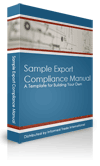ITAR Recordkeeping
If you’re a responsible ITAR exporter, record keeping is far and away your best tool to avoid fines and penalties from an audit. The goal of good record keeping is simple: Fulfill your legal obligation as an exporter and ensure success and minimal impact on your business in the event of an audit.
Earlier this month I took a straw poll from our mailing list and asked the question: “How do you fulfill your record keeping requirement?” The answers received were informative and in some cases surprising:
The Good
- From the companies that responded the vast majority have a system in place and are making a conscientious effort to maintain records (whew!).
- Most of the respondents keep a paper or digital file in order to store pieces of information that relate to their shipments.
- This includes purchase orders, shipping documents, delivery receipts, notes, etc.
- Having a single location where you can find all pertinent shipment information is very important in an audit.
- Of those keeping files most include a checklist identifying steps they’ve taken for due diligence.
- Checklists are easy to do and show that you’re taking a systematic approach to compliance.
- For those tracking physical shipments most included a central repository for tracking information for easy access later.
- Similar to paper files, being able to quickly assess your licenses and shipment data tells an auditor that you are competent and making an effort.
The OK, but Not Great
- Excel spreadsheet was the word of the day! Approximately 75% of those tracking shipments use a spreadsheet program.
- Spreadsheets are good for tracking data, but they’re difficult to share if you have multiple people tracking shipments.
- Consider the following line from Title 22, section 122.5 of the Code of Federal Regulations and ask yourself how it’s being addressed by your spreadsheet program:
- “This information must be stored in such a manner that none of it may be altered once it is initially recorded without recording all changes, who made them, and when they were made.“
- The majority of respondents did not address documentation for issues like training, hiring, foreign nationals and the like.
- Record keeping encompasses more than shipping products. In the event of an audit you will want to be able to produce records detailing all of your compliance efforts.
- Most of documentation and procedures were focused on the item being exported and its destination.
- Make sure to include a record of all the entities that interact with your exports – freight forwarders, receiving agents, shipping companies, etc.
The Bad
- Almost everyone considered the purchase or sale of their product as the start of their export compliance timeline and final shipment the end.
- Documentation can (and should) include pre-sales investigation and customer communication as well as post-delivery follow up.
- Accessibility will be an issue for many in the event of an audit due to organization.
- The amount of time needed to compile a shipment history is an indicator of preparedness in the event of an audit.
- A few of our respondents placed the burden of record keeping on their freight forwarders and Customs brokers.
- As an exporter, you are ultimately responsible for your shipments.
Posted on October 14th, 2011 by admin
Filed under: ITAR

